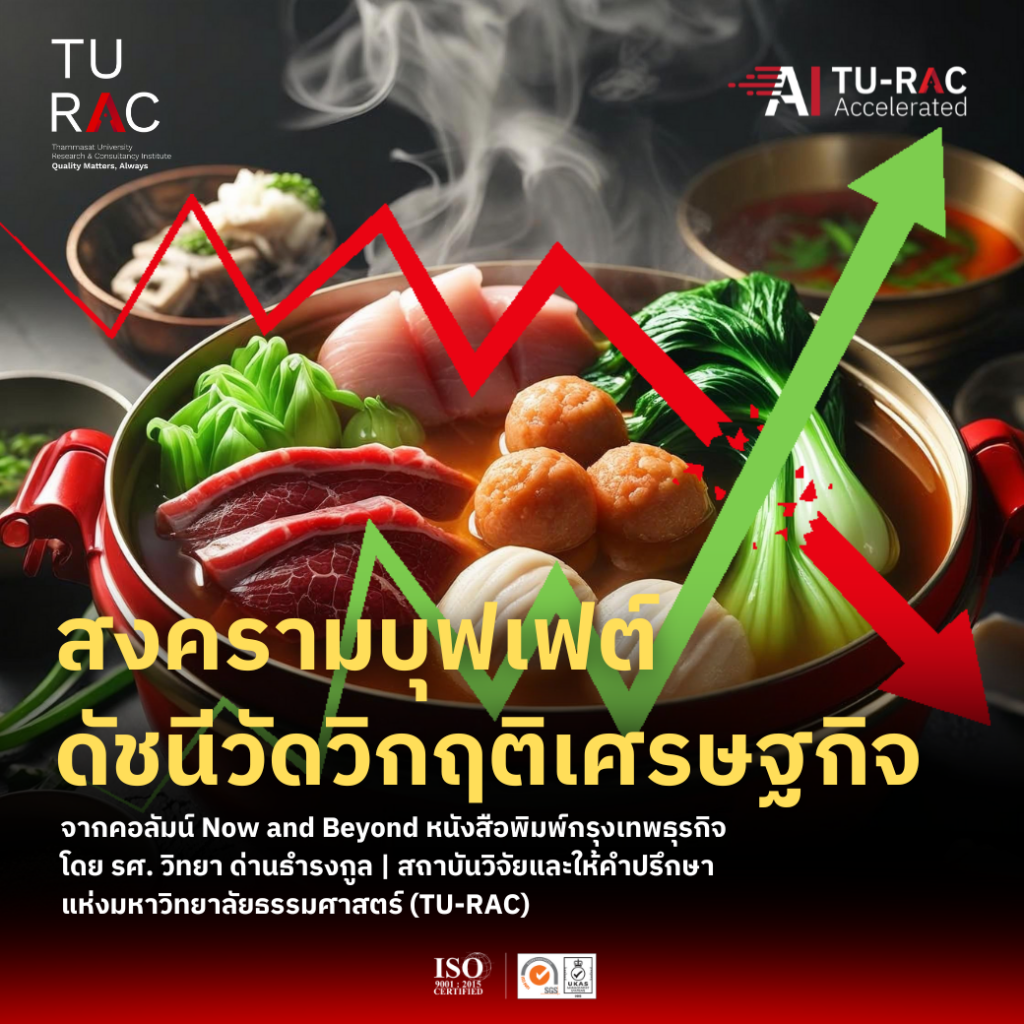TU-RAC ชวนอ่านบทความจากกรุงเทพธุรกิจ ในคอลัมน์ Now and Beyond by TU-RAC ทุกวันพฤหัสบดี ในหนังสือพิมพ์กรุงเทพธุรกิจ และกรุงเทพธุรกิจออนไลน์ เรื่อง สงครามบุฟเฟต์ ดัชนีวัดวิกฤติเศรษฐกิจ โดย รศ.วิทยา ด่านธำรงกูล สถาบันวิจัยและให้คำปรึกษาแห่งมหาวิทยาลัยธรรมศาสตร์ (TU-RAC)
.ในวันที่เศรษฐกิจชะลอตัว ผู้คนเริ่มมองหาความคุ้มค่าในทุกการใช้จ่าย หนึ่งในภาพสะท้อนที่ชัดเจนคือ “สงครามบุฟเฟต์” ร้านอาหารหลายแบรนด์ โดยเฉพาะสุกี้ชื่อดัง ต้องปรับกลยุทธ์ครั้งใหญ่เพื่อดึงดูดลูกค้าที่จับจ่ายอย่างระมัดระวัง
ร้านสุกี้ที่เคยครองตลาดด้วยสาขามากกว่า 400 แห่งในห้าง กลับพบว่ายอดขายลดลง จึงต้องออกโปรแรง ลดราคาถึง 50% หรือเปลี่ยนรูปแบบเป็นบุฟเฟต์แบบกินไม่อั้น ในขณะเดียวกัน ร้านนอกห้างและร้านเปิดดึกก็ผุดขึ้นราวดอกเห็ด เปิดบริการถึงตี 5 เพื่อตอบโจทย์ลูกค้าที่อยากอิ่มคุ้มในราคาจับต้องได้
การเติบโตของบุฟเฟต์ในช่วงนี้ ไม่ได้เป็นเพียงเทรนด์อาหาร แต่เป็นเหมือน “ดัชนี” วัดสภาพเศรษฐกิจ เมื่อผู้คนเลือกกินบุฟเฟต์เพื่อลดจำนวนมื้อ รวมมื้อเช้าและกลางวันเข้าไว้ด้วยกัน ขณะที่ผู้ประกอบการเองก็ลดต้นทุน ด้วยการใช้วัตถุดิบที่ถูกลง จ้างพนักงานชั่วคราว และปรับเมนูให้เรียบง่ายขึ้น
อย่างไรก็ตาม สงครามบุฟเฟต์อาจไม่ยืนยาว หากต้นทุนอาหารยังพุ่งสูงขึ้นเรื่อย ๆ เพราะสุดท้ายอาจทำให้ร้านต้องขึ้นราคา หรือคุณภาพลดลงจนลูกค้าหายไป เหมือนกรณีในต่างประเทศที่แม้บางร้านรอดจากวิกฤติได้ แต่ก็ต้องพึ่งโปรโมชั่นแรง ๆ เพื่อดึงลูกค้ากลับมา
“บุฟเฟต์” จึงไม่ใช่แค่ความอิ่มคุ้ม แต่ยังเป็นภาพสะท้อนว่า ทั้งผู้บริโภคและผู้ประกอบการต่างกำลังต่อสู้ เพื่อเอาตัวรอดในสมรภูมิเศรษฐกิจที่ท้าทายอย่างยิ่งในวันนี้
———————————————————————————————————————————————————————————————————————–
Buffet Wars: A Mirror of Thailand’s Economy
.
TU-RAC invites you to read the article from Bangkok Biz News in the column Now and Beyond by TU-RAC, published every Thursday in Bangkok Biz News print and online editions. This week’s topic is “Buffet Wars: An Index of Economic Crisis” by Assoc. Prof. Witaya Danthamrongkul, Thammasat University Research and Consultancy Institute (TU-RAC).
.
In times of economic slowdown, people are increasingly seeking value in every purchase. One of the clearest reflections of this trend is the so-called “Buffet Wars,” where many restaurant brands — especially leading suki chains — have had to make major strategic shifts to attract cautious spenders.
A suki restaurant chain that once dominated the market with more than 400 mall locations has seen its sales decline. In response, it has launched aggressive promotions, offering up to 50% discounts or switching to an all-you-can-eat buffet model. At the same time, off-mall restaurants and late-night venues are sprouting rapidly, staying open until 5 a.m. to cater to customers seeking an affordable, filling meal.
The rise of buffets today is not merely a food trend it serves as an “index” reflecting the state of the economy. Many consumers now choose buffets to cut the number of meals they eat, combining breakfast and lunch into a single sitting. Meanwhile, business owners are lowering costs by using cheaper ingredients, hiring temporary staff, and simplifying menus.
However, the Buffet Wars may not last. If food costs continue to soar, restaurants may be forced to raise prices or compromise on quality, driving customers away. Similar patterns have been seen abroad, where some buffet operators survived crises but only by relying on aggressive promotions to lure customers back.
Ultimately, buffets are more than just a “value for money” dining choice they are a vivid reflection of how both consumers and business owners are struggling to survive in today’s challenging economic battleground.
Read more: https://www.bangkokbiznews.com/business/economic/1193332



